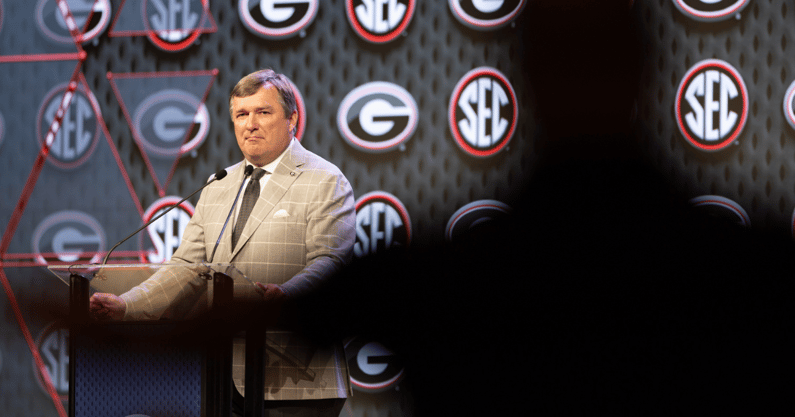Georgia football's Classic City NIL collective withholding payments for traffic-related incidents

With two traffic-related incidents last week, concerns about speeding and reckless driving remain around the Georgia football program.
Speaking Tuesday at SEC Media Days, Kirby Smart informed media members that multiple Georgia players face suspensions over driving violations.
According to the Atlanta Journal-Constitution, players, or other members of the UGA football program, have been charged by police for DUI, reckless driving or speeding 24 times in the last 18 months since the January 2023 car crash that killed player Devin Willock and staff member Chandler LeCroy. Police blamed the accident on excessive speed, racing and alcohol.
Facing questions about what Smart is doing to address concerns, the coach said the Classic City NIL Collective has been fining players involved in traffic-related incidents. It’s one of the first times fines have been acknowledge publicly.
“Our Classic City Collective for over a year has been substantially fining guys for those things,” Smart said in Dallas, according to On3’s Dawgs HQ. “That’s not something that’s new. That’s something that’s been ongoing outside of my jurisdiction that they decided to implement and have done for a considerable amount.”
However, Matt Hibbs, the founder and CEO of Classic City, told On3 on Tuesday afternoon the collective is not fining any Georgia football players. Instead, the organization withholds or deducts scheduled payments for players charged with car-related incidents.
The penalty is part of the agreement signed between the athlete and the collective. Hibbs cautioned that athletes are not being fined, as athletes are not considered employees. The decision to withhold payment came from conversations between Smart and Hibbs on how to address the ongoing situation.
The procedure has been in place for roughly two years, Hibbs said. The reasoning for withholding payments is an athlete who is arrested or charged has less value to the collective or a local business.
Top 10
- 1New
Baseball Top 25
Predicting another shakeup
- 2Trending
In-Race Assault
Sprinter attacked with baton
- 3
AP Poll Projection
Predicting the Top 25
- 4
Big Ten Tournament
Bracket set for Big Ten men's hoops
- 5Hot
Bracketology update
Field of 68 is coming into view
Get the On3 Top 10 to your inbox every morning
By clicking "Subscribe to Newsletter", I agree to On3's Privacy Notice, Terms, and use of my personal information described therein.
Hibbs told On3 the collective has withheld roughly six figures over the last two years. He declined to give a more specific figure.
Smart has not publicized suspensions in advance in the past, only confirming them after. He told reporters Tuesday that safety David Daniel-Sisavanh, who was arrested on reckless driving in February, has been dismissed from the program.
Morals clause common in NIL collective agreements
In nearly all NIL collective contracts, moral clauses are included if players are arrested with some organizations opting to void agreements if a situation arises. Other prominent NIL collectives have added language focused on academics. For example, breaching deliverables would not fall into a morals clause but instead in a contract’s description of obligations or termination rights.
Classic City’s morals clause includes language that allows the collective to deduct from Georgia football players’ pay, a source told On3.
On3 obtained a sample morals clause Tuesday to provide insight into what athletes sign. A source told On3 that most moral clauses are typically heavily negotiated.
Here is how a morals clause is structured:
“Athlete hereby further covenants that Athlete will not at any time during the Term engage in any conduct or activity of any nature whatsoever that may:(a) shock, insult or offend the general public; (b) bring Athlete and/or [collective] into public disrepute, contempt, scandal or ridicule and/or otherwise adversely affect Athlete’s and/or [collective]’s reputation, public image or goodwill; and/or (c) result in Athlete being charged with a crime by any governmental entity, regardless of whether such charge results in a conviction.”